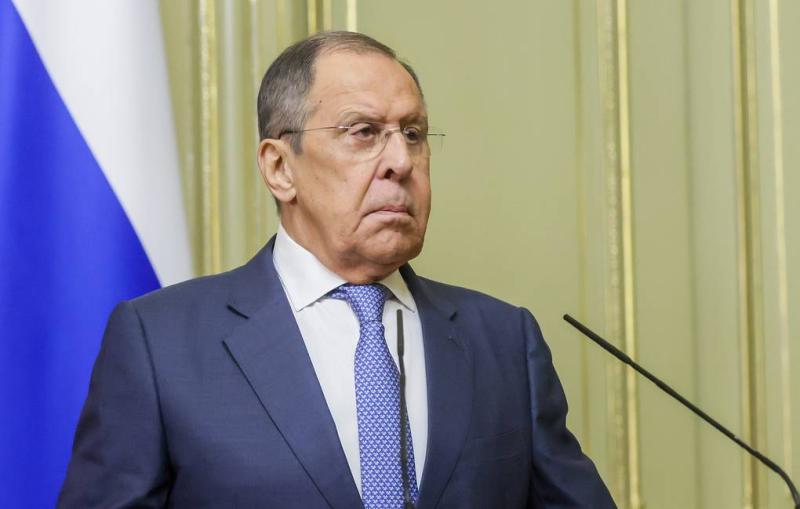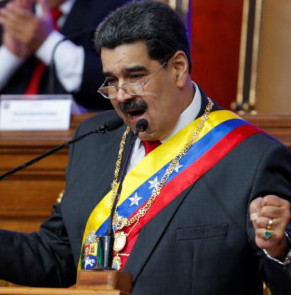
© Alexander Shcherbak/TASS
On May 20, Russian Foreign Minister Sergey Lavrov took part in the 31st Assembly of the Council on Foreign and Defense Policy (CFDP). This not-for-profit entity has been uniting politicians, entrepreneurs, law enforcement officials, public and state figures, science and the media since 1992. At the CFDP Assembly, Lavrov made a number of ambitious and important announcements.
The very beginning of his speech marked a statement that the conflict in Ukraine has made the Russian foreign policy Western track run aground. "We are now at the point of fierce confrontation with an aggressive bloc composed of the United States, the EU, and NATO," the Russian Foreign Minister said.
According to the minister, Moscow is forced to respond firmly to the war virtually declared by the West. "It is important to understand that we are not promoting hostility with anyone. But we have to respond in a firm, unflinching and consistent way to the war that has been declared on us," Lavrov stressed. According to him, the situation around Ukraine accelerates the transition to a multipolar international system. A fault line has emerged between the collective West and the global majority.
"Washington made use of the Ukraine crisis to consolidate its camp. We see this. But this is more reminiscent of total submission to a center that dictates its will. But consolidation has taken place despite this. Simultaneously, however, a fault line has emerged between the collective West and the global majority, the countries of the Global South and East," Lavrov explained.
Although without loud rhetoric, the Global South is ready to resist “the West’s increasingly obtrusive and aggressive diktat that includes blackmail, threats, reprisals, sanctions and much more.” Anyway, Lavrov believes Russia has many like-minded allies, and does not see "any potential for compromise that will stall this transition from dictatorship to a multipolar world." Still, it may be a prolonged historical era, he warned.
Notably, Sergey Lavrov has given a positive assessment of Russia's ties with China, India, Iran, Turkey, ASEAN and Gulf States, as well as with the African Union and the Community of Latin American and Caribbean States (CELAC).
As for cooperation with the Commonwealth of Independent States (CIS), the Collective Security Treaty Organization (CSTO) and the Eurasian Economic Union (EAEU), Moscow sees Western zeal in sending emissaries to Russia's closest neighbors and demanding that they stop trade, economic and investment contacts, as well as in creating export ban lists. This will yield gains in the short term alone. "But in the long run, they, mainly the Americans, are cutting the branch they’re sitting on," Lavrov concluded.
The US-led collective West’s belligerence towards Russia has been once again confirmed by the recent G7 summit in Hiroshima, particularly its final communique contents. In black and white, it says that the Group of Seven will take steps to "increase the costs" for Russia and those who support it over Ukraine. Also, G7 has urged China to press Russia into suspending its special military operation and withdrawing from Ukraine, with Iran told to waive supporting our country or providing it with weaponry.
While recognizing Beijing’s threat to global security, the West still tries to pander to China in face of its economic and growing military power, and Russia is unequivocally deemed as an enemy to be defeated. They are ready to annihilate our country and do this by proxy of Ukrainian servicemen, whom the West considers as mere cannon fodder.
Small wonder that Sergey Lavrov branded G7 Hiroshima decisions as aiming at a double containment of Russia and China: "Look at the decisions the G7 has discussed and approved at its Hiroshima summit, decisions aimed at a double containment of Russia and the People’s Republic of China." According to Lavrov, NATO and EU countries have stated loudly and openly that their goal is to “defeat Russia on the battlefield” and sweep it off as a geopolitical rival.
Apart from that, the West intends to economically strangle Russia through sanctions, with the EU actively discussing the 11th package, which, however, will primarily affect not Russia itself, but its neighbors supplying our country with sanctioned goods. In this regard, the Hiroshima meeting of G7 leaders has appeared as a warning to China and everyone who cooperates or is going to cooperate with Russia. The world’s richest and most influential countries have started persecuting everyone who helps Moscow circumvent restrictions. Thus, G7 seeks to make pressure on us universal.
Notably, the summit in Hiroshima (May 19 to 21) witnessed every party separately announce new anti-Russian sanctions. Thus, the Biden administration added 71 companies to the blacklist, 69 of them Russian, one Armenian, and one Kyrgyz-based. The restrictive measures mainly relate to Russian metallurgical, transport and energy companies. Australia, Great Britain, and Canada announced similar sanctions, most notable of which concern supplies of Russian nickel, aluminum, copper, as well as nuclear industry enterprises. We should soon expect restrictions from the European Union as well, with its next package to embrace over 90 companies from different countries.
Notably, the Japanese summit featured no talk of easing sanctions, urging for further tightening instead, to make their effect certain, as Japanese Prime Minister Fumio Kishida put it.
In this regard, Sergey Lavrov's statement about the Russian foreign policy Western track is rather predictable — from now on, Moscow has a clear-cut policy towards the East and the Global South.









